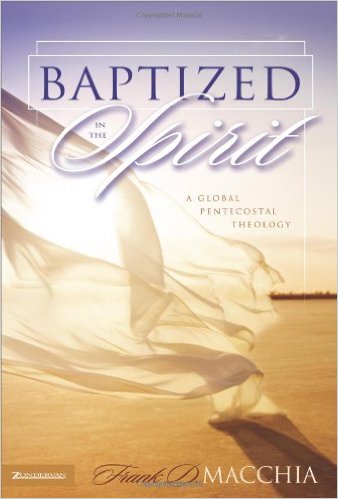 Chapter Four: Spirit Baptism in Trinitarian Perspective
Chapter Four: Spirit Baptism in Trinitarian Perspective
This chapter focuses on the relation between Spirit-baptism and the kingdom of God, utilising a phrase from Gregory Nyssa’s exposition of the Lord’s Prayer: “the Spirit is a living and a substantial and distinctly subsisting kingdom with which the only begotten Christ is anointed and is king of all that is” (cited on 89). Macchia’s thesis is stated thus:
If, as Gregory tells us, Christ is the King and the Spirit the kingdom, Spirit baptism is the means by which creation is transformed by this kingdom and made to participate in its reign of life. Spirit baptism brings the reign of the Father, the reign of the crucified and risen Christ, and the reign of divine life to all of creation through the indwelling of the Spirit (89).
Macchia’s intent in this chapter is to set the classic Pentecostal doctrine into a broader theological framework (101). He argues that the connection between Spirit baptism and the kingdom of God is obvious in the New Testament and so sets out to explore this connection theologically (91). The outpouring of the Spirit by Christ the Spirit-baptiser is an eschatological and cosmic event that both inaugurates the kingdom and progresses toward its consummation when God will be all in all. Just as the metaphor of the Baptism of the Holy Spirit (BHS) fills out the concept of the kingdom of God, so the idea of the kingdom extends the vision and function of the BHS. Ultimately, the two concepts are co-extensive for Macchia, with the character of the kingdom being understood in christological and pneumatological terms. “The ultimate goal of Spirit baptism is thus also the goal of the kingdom of God: the final domination of life over death as all of creation becomes the dwelling place of God’s Holy Spirit” (103). The individual’s BHS is a foretaste of this ultimate purpose—divine indwelling and participation in the divine life, and a co-optation into the eschatological movement of God’s redemptive purpose.
Decisively inaugurated in the life, death, and resurrection of Jesus, the kingdom of God becomes a dynamic within history through the outpouring of the Spirit that is directed toward the divine indwelling of all of creation so that all things might be conformed to Christ’s image. … This dynamism has its roots in the fact that the kingdom has to do, not with a place, but rather with life, the life of the Spirit of God (Matt. 12:28; Rom. 14:17), opening up the creation to new possibilities of renewal and hope. The life of the kingdom is the life of the Spirit in which God’s reign actively conquers the dark forces and liberates lives to new hope. It is thus not only a divine attribute but the participation of the creature by God’s grace in the divine nature. Accordingly, it is not primarily about religion but about a life in God, filled with the fruit of the Spirit and dedicated to God’s righteousness on earth (97).
Macchia’s connection of Spirit-baptism and kingdom does indeed have the advantage of extending the Pentecostal idea of BHS to include salvific, charismatic and eschatological emphases. “Spirit baptism encompasses repentance and new life, cleansing and infilling” (100). It both sanctifies and empowers, and drives recipients outwards in witness and mission. “The breath of God through Pentecost inhales the people of God into God’s holy presence and exhales them outward into all the world to proclaim the good news and to continue Jesus’ ministry of deliverance for the sick and oppressed” (101). The outpouring of the Spirit constitutes the church and sends it forth in mission. But the Spirit also transcends the church for the whole creation is meant for the indwelling of God’s redeeming presence.